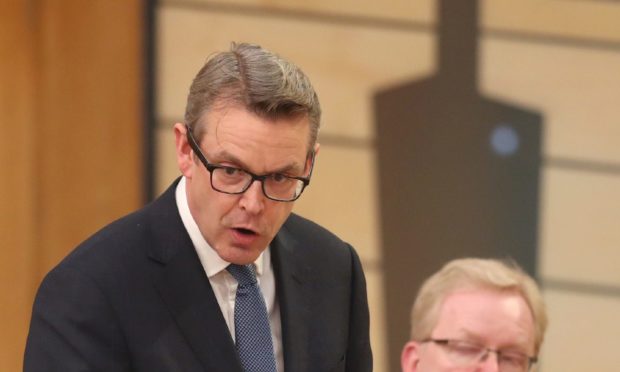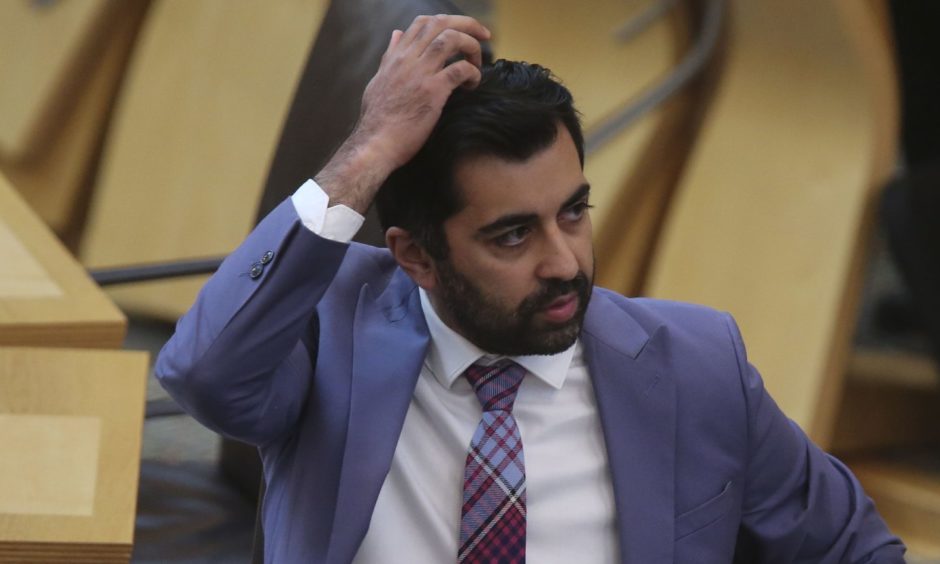The Scottish Parliament’s justice committee convener claims he is “disturbed” and “a little afraid” by the backlash to an amendment that sought to exempt “criticism of transgender identity” from hate crime laws.
Adam Tomkins MSP said the reaction over the last few days to the amendment on transgender identity made it “even more obvious and apparent that we absolutely must define what we mean”.
His remarks come after Justice Secretary Humza Yousaf announced on Monday that he had removed a planned freedom of expression amendment to the proposed Hate Crime and Public Order Bill, which seeks to consolidate and modernise hate crime laws in Scotland.
The move followed concerns from equality groups that the specific focus on transgender identity could leave individuals feeling “targeted and marginalised”.
It also comes after a personal intervention by First Minister Nicola Sturgeon over accusations of transphobia in the SNP, amid months of infighting and a bitter row over controversial changes to the Gender Recognition Act.
However, Mr Tomkins, who is a professor of public law at Glasgow University and convener of the justice committee, said he has been “disturbed” by the reaction to what he claims were “really quite modest, innocent and perfectly reasonable amendments”.
Mr Yousaf tabled an amendment last week to the Hate Crime and Public Order Bill that would have protected criticism of transgender identity as freedom of expression.
However, on Monday, the justice secretary revealed he had pulled the amendments in relation to freedom of expression and instead said he hoped to “achieve consensus” on a broad freedom of expression clause that covers all protected characteristics, “so no group feels targeted”.
We all want to ensure freedom of speech, including the freedom to disagree robustly with any policy, is protected. We also agree that this is not mutually exclusive to protecting the rights of people to be free from hatred.
I apologise for any hurt caused – was not my intention
— Humza Yousaf (@HumzaYousaf) February 1, 2021
‘Alarmed and distressed’
Mr Tomkins said: “I am alarmed and distressed, and perhaps even, if I’m honest, a little afraid of the reaction or aspects of the reaction to it (the amendment).”
He also made reference to remarks made by Scottish Greens co-leader Patrick Harvie on Monday, who claims there are “shockingly overt homophobic and transphobic amendments” within the bill.
Mr Tomkins told MSPs: “I think we have come to the point where if we are going to criminalise hate speech on grounds of transgender identity, we have got to define what we mean.
“I struggle to find an amendment that I thought was shockingly or overtly transphobic.
“Stating that sex is an immutable biological characteristic does not make you transphobic.
“Stating that there are only two sexes, does that make you transphobic, really?
“Using the word woman or man in equivalent terms or pronouns in a certain way, does that make you transphobic?”
The above relates to prospects for improving the Bill. That felt unlikely till a few days ago, but I'm more hopeful now.
At the same time there are also shockingly overt homophobic & transphobic amendments which would make the Bill far worse. It's vital that these are defeated.
— Patrick Harvie 🇪🇺🌈 (@patrickharvie) February 1, 2021
Mr Tomkins added that he felt a “conclusion had been reached behind closed doors” with the parties’ representative in parliament for a catch-all clause to cover all protected characteristics.
He also said if the challenge is to combat the problems of vagueness in the criminal law, then having a generic free speech provision “might not be the solution that some people seem to think it is”.
‘Further isolation’ of transgender communities
However, SNP MSP Fulton Macgregor, defending the decision to scrap the amendment, said he is “worried that this could lead to further isolation or marginalisation of our transgender communities”.
He said there “must be freedom of expression”, adding there has to be “scope for people to hold strongly held views on both sides of this debate”.
But he added that he is “glad” the amendment has been withdrawn and MSPs can “go back to the drawing board”.
In response to Mr Tomkins, the justice secretary said he recognised that there is an obligation on the Scottish Government to be “specific and provide that clarity” in terms of the legislation.
He added that he met a “number of stakeholders” on Friday who said the focus on being specific had “left groups feeling like they’re being targeted and marginalised”.
The committee will continue scrutinising its stage two amendments next week, with a freedom of expression clause coming forward at the final stage three proceedings.
Mr Yousaf added: “We are going to come back at stage three with, hopefully, a freedom of expression clause that will still be robust, that will still be strong, that will still provide the clarity and the precision that is needed but will hopefully not target or make any group feel they are being targeted in any way, shape or form.”
Free speech concerns
However, free speech campaigners claim their concerns remain “wholly unresolved” after Tuesday’s debate.
Jamie Gillies, spokesman for the Free to Disagree campaign, said: “MSPs on the Justice Committee have pledged to come up with a ‘catch-all’ free speech provision before stage three.
“However, drafting a provision that allows robust speech on the plethora of topics associated with the characteristics covered – not least contentious topics like transgender identity – will be no easy task.
“In all likelihood, the final result will be a weak, ill-defined clause that lacks the forensic detail required for criminal legislation.”
Tim Hopkins, director of the Equality Network, said: “We have no problem with an amendment to the bill upholding, for example, the freedom to discuss or criticise policies or policy proposals, so long as it applies fairly to all.
“We welcome the withdrawal this morning of amendments that were specifically about trans people, and could have been interpreted as giving the green light to, for example, deliberately referring to trans people using the wrong pronouns or the wrong first name.
“That is not something that it’s reasonable to encourage – if someone insisted on treating a work colleague that way, it would be unlawful harassment contrary to the Equality Act.”

